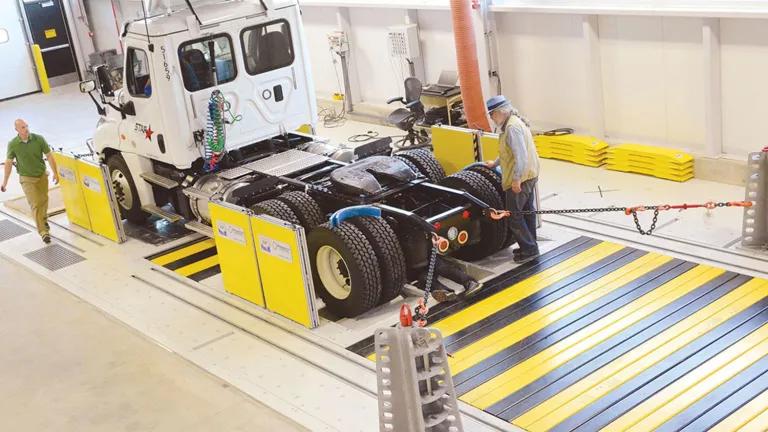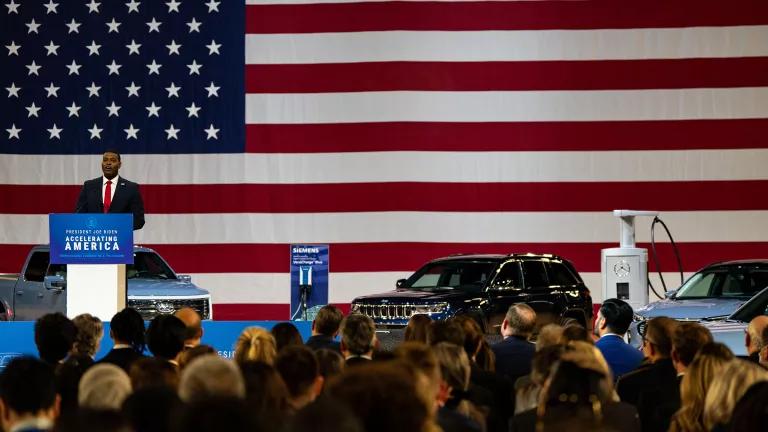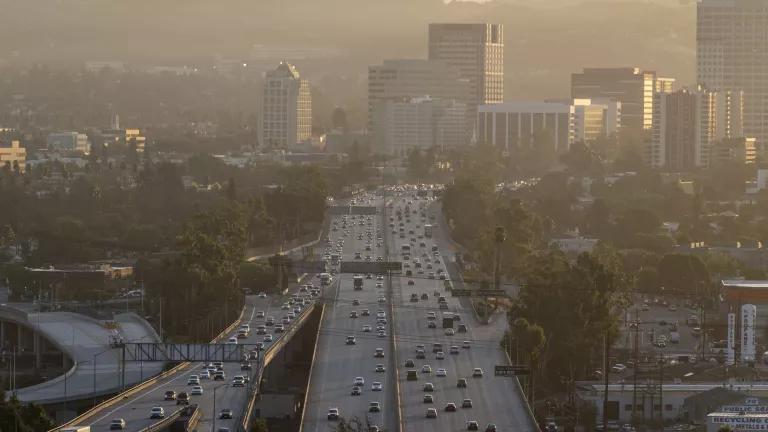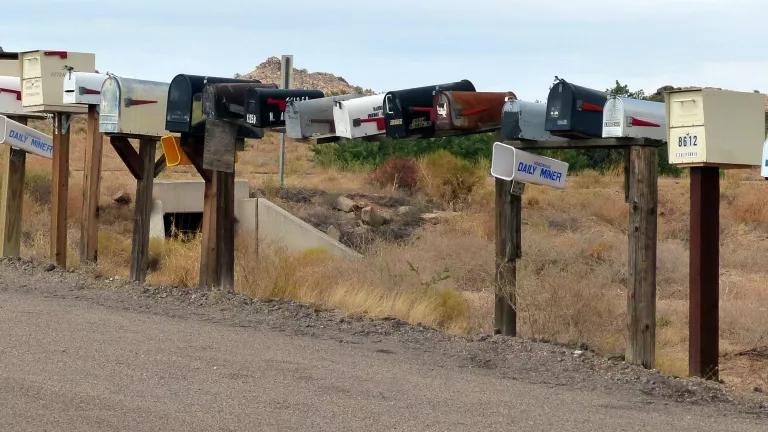Truck Makers' Greenwashing: Lobby Group Undermines Clean Air Standards
In addition to fighting state efforts to cut pollution from trucks, truck companies were able to weaken federal NOx standards designed to save lives.

A truck undergoes emissions testing at the EPA emissions laboratory in Ann Arbor, Michigan.
U.S. Environmental Protection Agency
Truck manufacturers keep talking publicly about how they are building better, cleaner vehicles. But through their funding for the Truck and Engine Manufacturers Association (EMA), they are fighting a battle to gut important standards that will deliver cleaner vehicles – and cleaner air for all of us. It’s time for these companies to decide. Are they really on the side of a cleaner future? Or are they choosing profits over people? If truck manufacturers are committed to the zero-emission vehicle (ZEV) transition, they cannot keep supporting underhanded attempts to undermine critical safeguards.
Last year, Influence Map released a report showing U.S. truck manufacturers, often via their lobbying organization the EMA, are working to weaken and delay key U.S. climate policies promoting zero-emission trucks, while simultaneously running marketing and public relations campaigns touting their efforts to cut pollution from their vehicles. The analysis drew on thousands of pages of previously unseen lobbying documents found from 33 Freedom of Information Act (FOIA) requests across 11 states.
Newly released documents from Influence Map, which were not included in the original report, show that not only is the EMA opposing the adoption of the state-based Advanced Clean Truck (ACT) rule, which accelerates the transition towards ZEVs, but it also was successful in lobbying to weaken critical smog reducing standards at the national level.
The EMA, which before recently was a little-known trade group representing the nation’s heavy-duty truck companies, has spent years fighting measures at both the state and national level that would provide frontline communities with relief from diesel pollution. EMA’s lobbying efforts have now been shown to impact the Environmental Protection Agency’s decision-makers.
Flying under the radar of the general public, media and clean air and environmental justice advocates, the EMA submitted comments to the EPA claiming that pollution-control systems don’t work as well in colder weather. As result, a loophole was tucked into the 1,200-page rule that sets weaker emissions thresholds that would be triggered at an unfathomably high temperature of 77 Fahrenheit (25C).
No doubt a part of their strategy, comments were submitted later in the rulemaking process. This last-ditch effort by the EMA precipitated a response by the California Air Resources Board, one of the foremost air quality agencies in the world, which refuted all of the EMA’s claims and showed that the suggested changes to the NOx standard would result in far fewer emissions reductions.
The first of its kind in more than two decades, the new rule was meant to make deep cuts in emissions of smog-forming pollution from 18-wheelers and other heavy-duty trucks starting with 2027 models. Not concerned with hiding behind their lobbying group, manufacturers including Daimler Truck North America and Navistar International Corp., support the loophole, which threatens to undermine the regulation’s potency.
However, EMA’s members are known to be split on the organization's actions because it goes against their efforts to greenwash their products. For example, Ford, Honda, GM and Cummins denounced a lawsuit targeting the implementation of the state-led Low NOx Heavy-Duty Omnibus standard. Ford went so far as to cut ties with the EMA altogether.
Earlier this year, 34 organizations representing business, health, climate and environmental justice communities across the country signed a letter that was delivered to the remaining EMA member companies calling on them to publicly separate themselves from the EMA lawsuit, as well as the harmful EMA lobbying and disinformation campaigns designed to slow or stall the transition to cleaner trucks.
There is a concentrated effort in the U.S. Congress to utilize the Congressional Review Act (CRA), a legislative tool used to permanently roll back regulations issued by federal agencies, to prevent any future standard that would regulate smog-forming emissions from trucks. Both the Senate and House of Representatives approved a CRA joint resolution that would overturn emissions standards issued by the EPA. However, President Biden took a stand for communities suffering from heavily polluted air and vetoed the CRA joint resolution. Fortunately, the President's veto was not overridden, thereby preventing the harmful CRA effort from advancing.
EMA members that have been silent on actions by the lobbying group must step away from the organization and step up to fight the CRA. We can no longer tolerate companies that tout green technologies while supporting efforts to weaken or delay lifesaving pollution standards.
More than one in three people live in communities with unhealthy levels of air pollution, so rolling back emissions standards not only puts lives at risk but also undermines EPA’s regulatory authority to safeguard public health. And, weak standards that leave clean air benefits on the table are the result of unchecked industry lobbying and lack of accountability for these billion-dollar companies.



